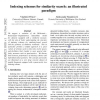Free Online Productivity Tools
i2Speak
i2Symbol
i2OCR
iTex2Img
iWeb2Print
iWeb2Shot
i2Type
iPdf2Split
iPdf2Merge
i2Bopomofo
i2Arabic
i2Style
i2Image
i2PDF
iLatex2Rtf
Sci2ools
FUIN
2006
2006
Indexing Schemes for Similarity Search: an Illustrated Paradigm
We suggest a variation of the Hellerstein-Koutsoupias--Papadimitriou indexability model for datasets equipped with a similarity measure, with the aim of better understanding the structure of indexing schemes for similarity-based search and the geometry of similarity workloads. This in particular provides a unified approach to a great variety of schemes used to index into metric spaces and facilitates their transfer to more general similarity measures such as quasi-metrics. We discuss links between performance of indexing schemes and high-dimensional geometry. The concepts and results are illustrated on a very large concrete dataset of peptide fragments equipped with a quasi-metric tree indexing scheme.
Related Content
| Added | 12 Dec 2010 |
| Updated | 12 Dec 2010 |
| Type | Journal |
| Year | 2006 |
| Where | FUIN |
| Authors | Vladimir Pestov, Aleksandar Stojmirovic |
Comments (0)

